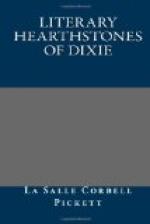Life flowed on pleasantly at Woodlands from October till May in those idyllic years before death had made a graveyard of the old home and fire had swept away the beautiful mansion.
William Gilmore Simms first opened his eyes upon the world of men in Charleston, at a time when to be properly born in Charleston meant to be born to the purple. William Gilmore, alas! did not inherit that imperial color. He sprang from the good red earth, whence comes the vigor of humanity, and dwelt in the rugged atmosphere of toil which the Charleston eye could never penetrate. Politically, the City by the Sea led the van in the hosts of Democracy; ethically, she remained far in the rear with the Divine Right of Kings and the Thirty-Nine Articles of Aristocracy.
So Charleston took little note of the boy whose father failed in trade and fared forth to fight British and Indians under Old Hickory and to wander in that far Southwest known as Mississippi to ascertain whether that remote frontier might offer a livelihood to the unfortunate. The small William Gilmore, left in the care of his grandmother, was apprenticed to a druggist and became a familiar figure on the streets of Charleston as he came and went on his round of errands. Small wonder that the Queen of the Sea, having swallowed his pills and powders in those early days, had little taste for his literary output in after years.
In Charleston he not only learned the drug business, but took his first course in the useful art of deception, reading and writing verses by the light of a candle concealed in a box, to hide its rays from his thrifty grandmother, who was adverse not only to the waste of candles but to the squandering of good sleep-time.
Fortunately, she had no objection to furnishing him with entertainment in off hours. For the material of much of his work in after life was he indebted to the war stories and ancient traditions that she told her eager little grandson in those ’prentice days. But for her olden tales, the romances of Revolutionary South Carolina and the shivery fascination of “Dismal Castle” might have been unknown to future readers.
All the region around Charleston, so rich in historic memories, was an inspiration to the future romance writer. The aged trees festooned with heavy gray moss lent him visions of the past to reappear in many a volume. In his boat in Charleston harbor, and on the sands looking out over the ocean, he gathered that collection of sea pictures which adorned his prose and verse in the years to come.
Over on Morris Island glowed the Charleston light, “the pale, star-like beacon, set by the guardian civilization on the edges of the great deep.” Lying on the shore he watched “the swarthy beauty, Night, enveloped in dark mantle, passing with all her train of starry servitors; even as some queenly mourner, followed by legions of gay and brilliant courtiers, glides slowly and mournfully in sad state




